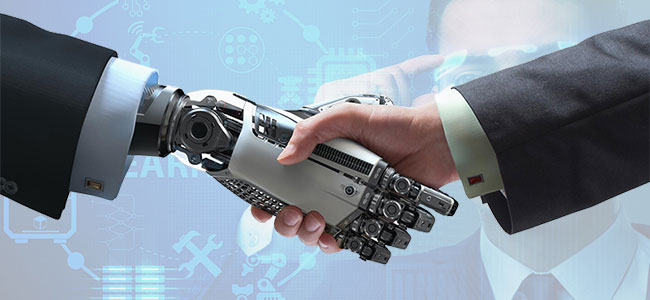“The potential benefits are huge; everything that civilization has to offer is a product of human intelligence; we cannot predict what we might achieve when this intelligence is magnified by the tools that AI may provide…” Stephen Hawking famously wrote about the potential for AI to aid humans in creating unprecedented transformation and innovation.
Today’s businesses focus on improving the customer experience. Customers have more options than ever before, so maintaining loyalty requires innovation, speed, responsiveness and the tools to predict the wants, needs, and preferences of the consumer or client.
AI and the Machine Learning Factor
AI and Machine Learning provides incredibly valuable opportunities for organizations to win over the customer and meld incomparable human insight and judgment with automated intelligence to improve the overall customer experience.
Business Analytics systems, most significantly in enterprise environments, are dependent on Machine Learning to process unquantifiable scores of data, and make distinctions between useful, meaningful data, and valueless data.
Most importantly, Machine Learning is giving customers personalized experiences, and enabling businesses to cater a customer of one. Businesses want to be able to offer a unique experience to each customer, and which we see every day through targeted marketing when you log on social media sites, and through personalized recommendations from Netflix and Amazon.
However, the impact of the human element can’t be discounted. Businesses need human insight, blended with automated intelligence, to derive the real value of Machine Learning. Machine Learning is a tool, not a replacement for trusted human instinct, perspective, ethics, business acumen, contextual understanding, and emotional connection.
Machine Learning and the Customer Experience
Interacting with automated processes, like Chat Bots, has become standardized practice when using various websites. Natural Language Processing is common whenever calling in for customer service with banks, credit card companies, hotels, and travel sites, and guided company menus. These popular methods of customer engagement are highly recognizable.
Businesses use Machine Learning algorithms to refine and customize technological interactions and direct marketing campaigns to more fruitful outcomes. By mimicking human based cognitive functions, reasoning, learning, and problem-solving, Machine Learning is helping support human tasks and functions and helping companies address customer needs.
Other examples of how Machine Learning supports the customer experience:
- Personalized recommendations allow businesses to target customer preferences as for specific individuals rather than generic demographics.
- Targeted ads that are specific to a person’s preferences, browsing activity, and social media activities.
- Implementing virtual assistants to help alleviate potentially frustrating customer service interactions and resolve customer complaints.
- Automating internal processes, such as correctly routing customer requests to the right agents.
- Elevating the customer experience with real-time responsiveness.
Machine Learning Limitations and Advantages
There are numerous advantages of applying Machine Learning technologies within a business infrastructure, yet this needs to be done with acknowledgment of its limitations. Businesses need to constantly work with and improve their algorithms to eliminate uncertainty, personalize recommendations, and gain an understanding of customer behavior and activities.
Machine Learning limitations:
- Human communication can’t be mapped by simple encoding for a limited number of potential interactions, so the merging of language, emotional sentiment, empathy, and expression isn’t as accurately interpretable by Machine Learning.
- Machine Learning can make mistakes; it can provide false negatives and positives and is capable of replicating human bigotry.
- It’s not completely trustworthy, and models need to be used by people and deployed by organizations with consideration to certain responsibilities and liabilities.
Advantages of Machine Learning:
- Removes the likelihood of human error and can improve safety measures in certain environments like driving or industrial sectors.
- Can repeat repetitive processes much faster and more efficiently than humans.
- Supports human efficiency and productivity within an organization.
- Machine Learning can update data from numerous sources much more quickly than humans.
Don’t Discount the Human Element
Machine Learning is not infallible; it can be subject to bias, and certain models can exhibit learned discriminatory behaviors. When building machine learning algorithms, it’s important that there’s a human influence to reduce chances of bias in data, and ensure that the models aren’t overfitted or under-fitted, both of which can compromise the performance of the training data and demonstrate high bias.
Data, human expertise, and curated technology are what helps businesses leverage solutions and better cater to customers. Advanced analytical capabilities from Machine Learning and trusted human insight leads to a higher quality, tailored customer experience across all channels.
Human Insights to Influence Machine Learning
How human insights shape Machine Learning capabilities:
- Humans react and express themselves depending on different contexts. The emotions and language we use to express ourselves are very complex.
- Humans recognize patterns in data and use this information to make informed decisions.
- Humans have to define the problems that Machine Learning needs to solve and guide the design.
- Human interaction influences and modifies Machine Learning outputs.
- Humans understand how to align business goals with focused customer
Merging human comprehension with Machine Learning based algorithms can make it possible to unravel and decipher sentiment based insights. Simply put, business development is dependent on human qualities.
Definitive Business Actions Built on Human Capabilities and Intelligent Technology
Machine Learning insights can be used to improve customer support and the customer experience, evaluate potentially successful marketing and sales campaigns, market risks, and present real business growth opportunities. But when intertwined with human insight, Machine Learning insights make sense and are engineered to provide multi-layered value.
Human insights are invaluable, indispensable, and irreplaceable in customer understanding. Research Optimus (ROP) merges the proficiency, education, and contextual understanding of expert analysts with automated technologies to assist businesses with confidently prioritize and engage the customer.
– Research Optimus





